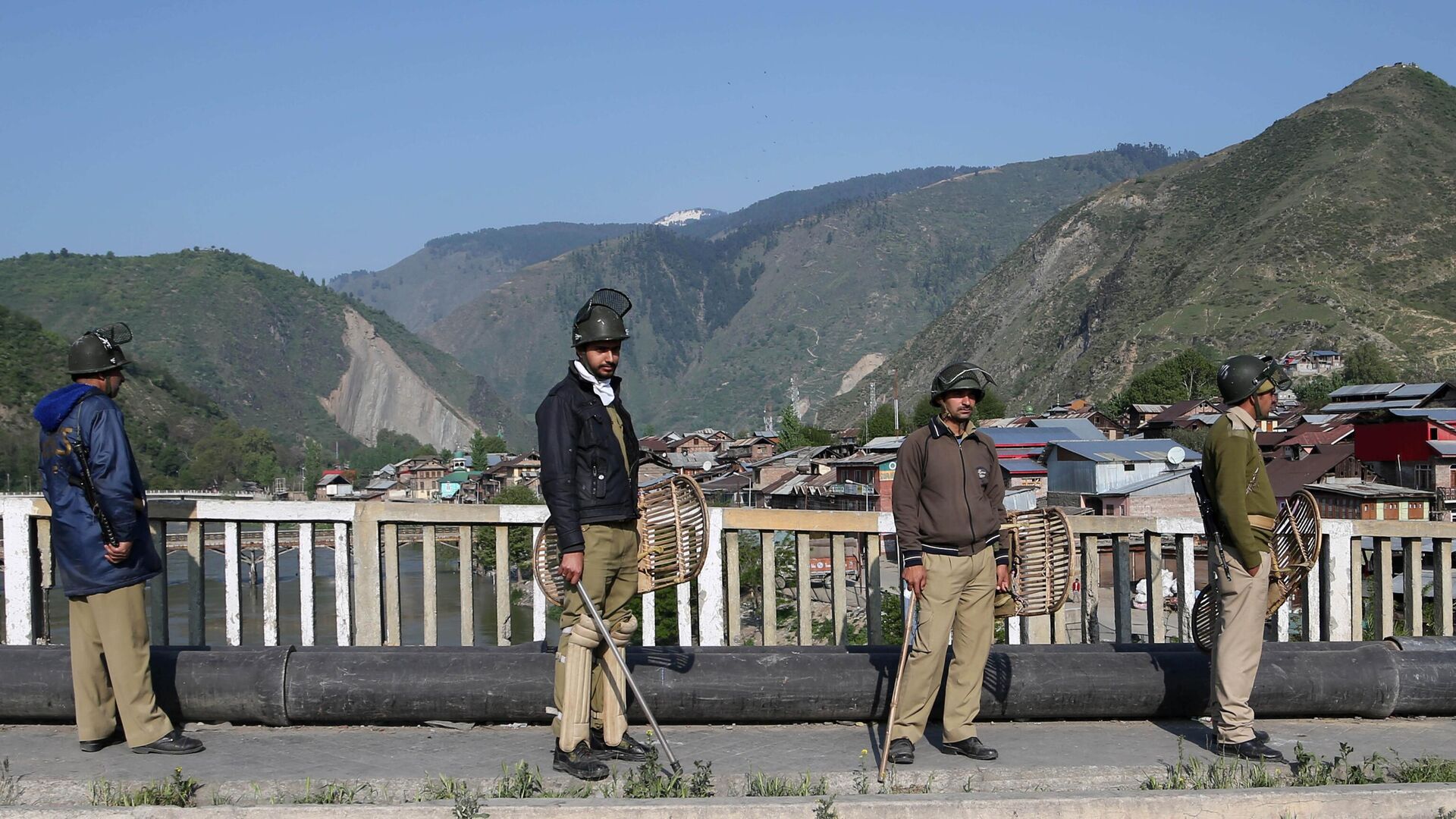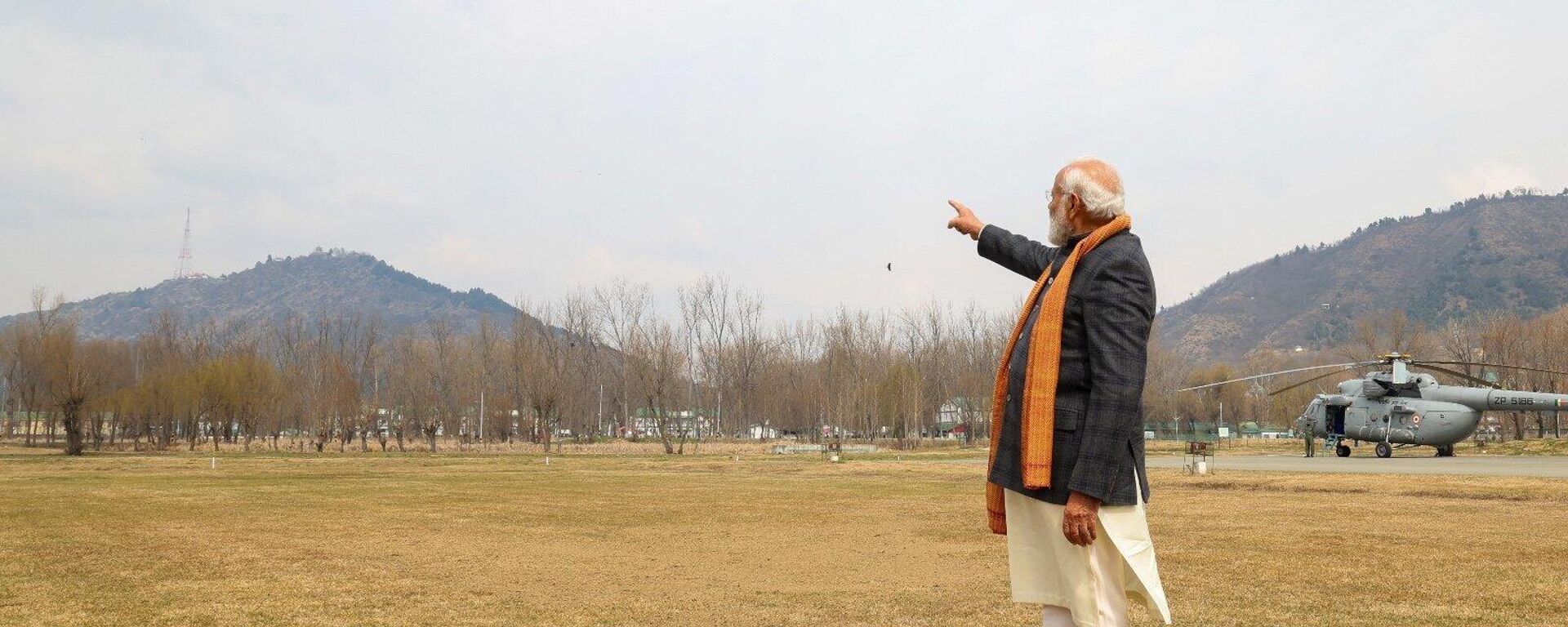https://sputniknews.in/20240831/guide-to-2024-kashmir-elections-8083609.html
Guide to 2024 Kashmir Elections
Guide to 2024 Kashmir Elections
Sputnik India
With Kashmir assembly elections just around the corner, Sputnik India looks at who the major players are in Jammu and Kashmir, as well as the new trends emerging from the polls.
2024-08-31T15:57+0530
2024-08-31T15:57+0530
2024-08-31T15:57+0530
jammu and kashmir (j&k)
bharatiya janata party (bjp)
omar abdullah
indian national congress (inc)
ghulam nabi azad
jammu
india
https://cdn1.img.sputniknews.in/img/07e8/03/05/6750773_0:160:3072:1888_1920x0_80_0_0_2f7194c2f4d329d65e2e39c62e610bae.jpg
The assembly elections in Jammu and Kashmir will take place after a decade-long hiatus. During this period, the region experienced significant constitutional changes when the federal government revoked its semi-autonomous status under Article 370 of the Indian Constitution.These changes have impacted governance and security, with the Bharatiya Janata Party claiming improvements in the conflict-prone area. The political landscape has also shifted, leading to new alliances, the emergence of new political parties, and even separatist groups expressing a willingness to participate in elections they previously boycotted.Bhartiya Janata Party (BJP)In the 2014 assembly elections, the BJP became the second-largest party by winning 25 seats, all in the Hindu-majority Jammu province, where it has maintained a stronghold. The BJP has consistently won both of Jammu's parliamentary seats in the last three general elections. However, the party has struggled to gain traction in the Kashmir province. Confident about its prospects in Jammu, the BJP may rely on alliances with friendly Kashmiri parties to form the next government. Party leaders have stated they won’t enter a pre-poll alliance, but it's unclear if they will contest all 90 seats.National Conference and Indian National Congress allianceThe National Conference (NC) and Indian National Congress (INC) have formed an alliance to contest the upcoming J&K assembly elections. The NC will contest 51 seats, the INC 32, with one seat each allotted to the Communist Party of India (Marxist) and the Jammu-based Panthers Party. The two parties will have a "friendly fight" over the remaining five seats due to disagreements on seat sharing. The Congress will focus on Jammu, while the NC will concentrate on Kashmir.Peoples Democratic Party (PDP)The PDP, a relatively newer party than the NC, has governed J&K twice in its 25-year history.The last time PDP was in power was between 2014 to 2018 when they forged an alliance with the Bhartiya Janata Party (BJP). However the government fell over differences and the PDP since the abrogation of Article 370 has been vocal against the federal government’s decisions and policies.While it is part of the INDI alliance, the PDP is not included in the J&K electoral alliance. Despite vowing not to contest elections until J&K’s former status is restored, the PDP aims to secure seats in the next assembly to maintain its presence in Kashmir politics. After losing all three seats in the 2024 general elections, the party hopes to win at least half a dozen seats to stay relevant in the region.Peoples Conference, Apni Party, DPAPPeoples Conference (PC), headed by former cabinet minister and previously a separatist leader, Sajad Lone, has political strongholds in northern Kashmir region. The party was part of the BJP-PDP coalition in 2014 and has been accused of close ties with the BJP, even acting as a proxy in the last parliamentary elections, though it performed poorly, with Lone finishing third.Apni Party (AP), formed in 2020, faces similar allegations and its leader Altaf Bukhari, previously a minister in the BJP-PDP coalition, has not hidden his intentions to work for the BJP in multiple interviews during the 2024 general elections. Democratic Progressive Azad Party (DPAP), the newest of political outfits in Kashmir, was formed by INC rebels headed by former J&K state chief and cabinet minister Ghulam Nabi Azad. PC, AP and DPAP parties are all outfits, which do not have a state wide presence but can be an important factor in a few seats that could have a bearing on the next government if no single party is able to muster up a majority on its own.Awami Ittehad Party (AIP)Led by Sheikh Abdul Rashid, an incarcerated politician on terrorism charges, emerged as a significant force in the 2024 general elections when Rashid, campaigning from jail, defeated former state chief Omar Abdullah and outperformed Peoples Conference in their stronghold in north Kashmir.Rashid's strong performance, leading in over a dozen assembly segments, has alarmed traditional parties like NC and INC.SeparatistsSeparatist groups in Kashmir, including Jamaat-e-Islami* (JeL), have boycotted elections since militancy began in 1989, viewing participation as endorsing Indian rule.A crackdown on separatism and militant activities in Kashmir after the abrogation of article 370 has prompted the JeL to reconsider its boycott of elections.JeL has made it clear that it will support some independent candidates in the polls, a departure from their previous strategy.*designated terrorist organization by Russia
https://sputniknews.in/20240705/political-turmoil-in-kashmir-ahead-of-state-elections-7780271.html
jammu and kashmir (j&k)
jammu
india
Sputnik India
feedback.hindi@sputniknews.com
+74956456601
MIA „Rossiya Segodnya“
2024
Azaan Javaid
https://cdn1.img.sputniknews.in/img/07e6/0c/08/19280_0:0:1080:1080_100x100_80_0_0_d0f3f10ac6f30fb5b9e5e21a5e2536ea.jpg
Azaan Javaid
https://cdn1.img.sputniknews.in/img/07e6/0c/08/19280_0:0:1080:1080_100x100_80_0_0_d0f3f10ac6f30fb5b9e5e21a5e2536ea.jpg
News
en_IN
Sputnik India
feedback.hindi@sputniknews.com
+74956456601
MIA „Rossiya Segodnya“
Sputnik India
feedback.hindi@sputniknews.com
+74956456601
MIA „Rossiya Segodnya“
Azaan Javaid
https://cdn1.img.sputniknews.in/img/07e6/0c/08/19280_0:0:1080:1080_100x100_80_0_0_d0f3f10ac6f30fb5b9e5e21a5e2536ea.jpg
jammu and kashmir, srinagar, jammu, national conference, peoples democratic party, indian national congress, bhartiya janata party, engineer rashid, omar abdullah, sajad lone, mehbooba mufti, narendra modi
jammu and kashmir, srinagar, jammu, national conference, peoples democratic party, indian national congress, bhartiya janata party, engineer rashid, omar abdullah, sajad lone, mehbooba mufti, narendra modi
Guide to 2024 Kashmir Elections
With Kashmir assembly elections just around the corner, Sputnik India looks at who the major players are in Jammu and Kashmir, as well as the new trends emerging from the polls.
The assembly elections in Jammu and Kashmir will take place after a
decade-long hiatus. During this period, the region experienced significant constitutional changes when the federal government revoked its semi-autonomous status under
Article 370 of the Indian Constitution.
These changes have
impacted governance and security, with the
Bharatiya Janata Party claiming improvements in the conflict-prone area. The political landscape has also shifted, leading to new alliances, the emergence of new political parties, and even separatist groups expressing a willingness to participate in elections they previously boycotted.
Bhartiya Janata Party (BJP)
In the 2014 assembly elections, the
BJP became the second-largest party by
winning 25 seats, all in the Hindu-majority Jammu province, where it has maintained a stronghold.
The BJP has consistently won both of Jammu's parliamentary seats in the last three general elections. However, the party has struggled to gain traction in the Kashmir province. Confident about its prospects in Jammu, the BJP may rely on alliances with friendly Kashmiri parties to form the next government. Party leaders have stated they won’t enter a pre-poll alliance, but it's unclear if they will contest all 90 seats.
“We will fight the elections on our own strength as we have been doing in the past. But we are also keeping close eye on other parties that are nationalist, support development and peace,” RS Pathania, senior BJP politician and former Member of Legislative assembly told Sputnik India.
National Conference and Indian National Congress alliance
The
National Conference (NC) and
Indian National Congress (INC) have formed an
alliance to contest the upcoming J&K assembly elections.
The NC will contest 51 seats, the INC 32, with one seat each allotted to the Communist Party of India (Marxist) and the Jammu-based Panthers Party. The two parties will have a "friendly fight" over the remaining five seats due to disagreements on seat sharing. The Congress will focus on Jammu, while the NC will concentrate on Kashmir.
“The difference between the winning candidates of Jammu and our candidates was far less in the last general elections in comparison with the 2019 parliamentary polls. You will see Congress performing better in Jammu as was evident in the parliamentary polls. The NC performance in Kashmir was praiseworthy,” Ghulam Nabi Monga, senior Congress politician told Sputnik India.
Peoples Democratic Party (PDP)
The PDP, a relatively newer party than the NC, has governed J&K twice in its 25-year history.
The last time PDP was in power was between 2014 to 2018 when they forged an alliance with the Bhartiya Janata Party (BJP). However the government fell over differences and the PDP since the abrogation of Article 370 has been vocal against the federal government’s decisions and policies.
While it is part of the INDI alliance, the PDP is not included in the J&K electoral alliance. Despite vowing not to contest elections until J&K’s former status is restored, the PDP aims to secure seats in the next assembly to maintain its presence in Kashmir politics. After losing all three seats in the 2024 general elections, the party hopes to win at least half a dozen seats to stay relevant in the region.
Peoples Conference, Apni Party, DPAP
Peoples Conference (PC), headed by former cabinet minister and previously a separatist leader,
Sajad Lone, has political strongholds in northern Kashmir region.
The party was part of the BJP-PDP coalition in 2014 and has been accused of close ties with the BJP, even acting as a proxy in the last parliamentary elections, though it performed poorly, with Lone finishing third.
Apni Party (AP), formed in 2020, faces similar allegations and its leader Altaf Bukhari, previously a minister in the BJP-PDP coalition, has not hidden his intentions to work for the BJP in multiple interviews during the 2024 general elections.
Democratic Progressive Azad Party (DPAP), the newest of political outfits in Kashmir, was formed by INC rebels headed by former J&K state chief and cabinet minister Ghulam Nabi Azad. PC, AP and DPAP parties are all outfits, which do not have a state wide presence but can be an important factor in a few seats that could have a bearing on the next government if no single party is able to muster up a majority on its own.
"Forming a government on their own is just unrealistic for parties like Peoples Conference, Apni Party and others as was evident by the votes they got in the 2024 general elections," one political analyst based in Kashmir told Sputnik.
Awami Ittehad Party (AIP)
Led by Sheikh Abdul Rashid, an incarcerated politician on terrorism charges, emerged as a significant force in the 2024 general elections when Rashid, campaigning from jail, defeated former state chief Omar Abdullah and outperformed Peoples Conference in their stronghold in north Kashmir.
Rashid's strong performance, leading in over a dozen assembly segments, has alarmed traditional parties like NC and INC.
“We will emerge as the biggest non-traditional party (NC and PDP) in opposition to BJP. Our main focus will be addressing human rights issues here,” Firdous Baba, AIP spokesperson told Sputnik.
Separatist groups in Kashmir, including Jamaat-e-Islami* (JeL), have boycotted elections since militancy began in 1989, viewing participation as endorsing Indian rule.
A crackdown on separatism and militant activities in Kashmir after the abrogation of article 370 has prompted the JeL to reconsider its boycott of elections.
JeL has made it clear that it will support some independent candidates in the polls, a departure from their previous strategy.
*designated terrorist organization by Russia



